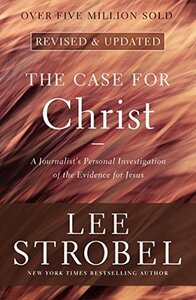Take a photo of a barcode or cover
403 reviews for:
The Case for Christ: A Journalist's Personal Investigation of the Evidence for Jesus
Lee Strobel
403 reviews for:
The Case for Christ: A Journalist's Personal Investigation of the Evidence for Jesus
Lee Strobel
So, so good! I'm on my journey to build my relationship with Jesus and my faith and hearing Lee go through his journey from atheist to skeptic to believer was absolutely amazing!
The apostle Paul said in 1 Corinthians 15:17 that the Resurrection is the very linchpin of the Christian faith: “If Christ has not been raised, your faith is futile; you are still in your sins.”
In The Case for Christ: A Journalist's Personal Investigation of the Evidence for Jesus Lee Strobel speaks with leaders in the field history, archaeology, pathology, divinity, theologians and other researchers for them give their take on whether Jesus actually walked this earth.
On Good Friday I watched a video and gave proof that Jesus existed outside of the Bible, since then I have been watching and reading different materials but this book gave an in-depth look and made a solid case that Jesus existed/exists. I get up in the Anglican church, I think I have been a half-hearted Christian all my life, I have seen and felt Jesus worked in my life so I knew in my heart he exists but my head... not so much. This is why I enjoyed this book so much, it tells us in no uncertain terms that was here, that my faith is not futile.
I liked how the book was structured, Strobel made it really easy to read. I particularly liked the historical look and context, because context is key and I cannot use my current knowledge to understand the Bible or the culture at the time Jesus was alive as a human.
After finishing this book I felt stronger in my faith and a stronger urge to walk a straighter path.
I learned a lot reading this book but what stood out for me was:
Literally, excruciating means ‘out of the cross.’ Think of that: they needed to create a new word, because there was nothing in the language that could describe the intense anguish caused during the crucifixion.
In The Case for Christ: A Journalist's Personal Investigation of the Evidence for Jesus Lee Strobel speaks with leaders in the field history, archaeology, pathology, divinity, theologians and other researchers for them give their take on whether Jesus actually walked this earth.
On Good Friday I watched a video and gave proof that Jesus existed outside of the Bible, since then I have been watching and reading different materials but this book gave an in-depth look and made a solid case that Jesus existed/exists. I get up in the Anglican church, I think I have been a half-hearted Christian all my life, I have seen and felt Jesus worked in my life so I knew in my heart he exists but my head... not so much. This is why I enjoyed this book so much, it tells us in no uncertain terms that was here, that my faith is not futile.
I liked how the book was structured, Strobel made it really easy to read. I particularly liked the historical look and context, because context is key and I cannot use my current knowledge to understand the Bible or the culture at the time Jesus was alive as a human.
After finishing this book I felt stronger in my faith and a stronger urge to walk a straighter path.
I learned a lot reading this book but what stood out for me was:
Literally, excruciating means ‘out of the cross.’ Think of that: they needed to create a new word, because there was nothing in the language that could describe the intense anguish caused during the crucifixion.
This was my first book on apologetics and I thought it was great. Definitely a "read it, put it down, digest, come back" kind of book. At times it got too detailed but some people need all the details. I would recommend it to anyone searching for the truth.
informative
medium-paced
Fantastic; this book is so intelligent and so well-researched. I'm going to lend my copy to some of my athiest friends.
This book made me eye roll so hard I thought my eyes would get stuck. There are plenty of reviews stating that this book is nonsense so I don't feel the need to go into too much detail. However, some of the things these "experts" said about Judaism and Islam was just plain wrong. In light of this it is really hard to take any of these people seriously. Their arguments are simply not convincing. The only interesting parts of this book had to do with the true crime aspect which was a very small percentage of the book overall.
If you question the validity of the Bible, Strobel does a really good job asking questions and getting confirming answers from very reliable scholars.
Interesting read. I don't know that it would have convinced me of anything if I wasn't already a Christian, but reading it from the perspective of a believer, I did feel like it gave me a better historical foundation. The best part of the content is the quotes from the experts he visited. The rest of the writing felt like it was trying SO hard to convince me, from the description of each expert's qualifications to the "internal dialogue"-type writing during the interviews. I'm probably not explaining that well, but there was something about it that annoyed me. All in all, though, it's an easy read and gives a lot of recommendations for additional resources in various areas. It's a useful starting point for deeper study.
The apostle Paul said in 1 Corinthians 15:17 that the Resurrection is the very linchpin of the Christian faith: “If Christ has not been raised, your faith is futile; you are still in your sins.”
In The Case for Christ: A Journalist's Personal Investigation of the Evidence for Jesus Lee Strobel speaks with leaders in the field history, archaeology, pathology, divinity, theologians and other researchers for them give their take on whether Jesus actually walked this earth.
On Good Friday I watched a video and gave proof that Jesus existed outside of the Bible, since then I have been watching and reading different materials but this book gave an in-depth look and made a solid case that Jesus existed/exists. I get up in the Anglican church, I think I have been a half-hearted Christian all my life, I have seen and felt Jesus worked in my life so I knew in my heart he exists but my head... not so much. This is why I enjoyed this book so much, it tells us in no uncertain terms that was here, that my faith is not futile.
I liked how the book was structured, Strobel made it really easy to read. I particularly liked the historical look and context, because context is key and I cannot use my current knowledge to understand the Bible or the culture at the time Jesus was alive as a human.
After finishing this book I felt stronger in my faith and a stronger urge to walk a straighter path.
I learned a lot reading this book but what stood out for me was:
Literally, excruciating means ‘out of the cross.’ Think of that: they needed to create a new word, because there was nothing in the language that could describe the intense anguish caused during the crucifixion.
In The Case for Christ: A Journalist's Personal Investigation of the Evidence for Jesus Lee Strobel speaks with leaders in the field history, archaeology, pathology, divinity, theologians and other researchers for them give their take on whether Jesus actually walked this earth.
On Good Friday I watched a video and gave proof that Jesus existed outside of the Bible, since then I have been watching and reading different materials but this book gave an in-depth look and made a solid case that Jesus existed/exists. I get up in the Anglican church, I think I have been a half-hearted Christian all my life, I have seen and felt Jesus worked in my life so I knew in my heart he exists but my head... not so much. This is why I enjoyed this book so much, it tells us in no uncertain terms that was here, that my faith is not futile.
I liked how the book was structured, Strobel made it really easy to read. I particularly liked the historical look and context, because context is key and I cannot use my current knowledge to understand the Bible or the culture at the time Jesus was alive as a human.
After finishing this book I felt stronger in my faith and a stronger urge to walk a straighter path.
I learned a lot reading this book but what stood out for me was:
Literally, excruciating means ‘out of the cross.’ Think of that: they needed to create a new word, because there was nothing in the language that could describe the intense anguish caused during the crucifixion.
As a student of apologetics at the expense of my personal time and research, much of the material contained in this book I was already familiar with. I had read “Evidence that Demands a Verdict” by Josh McDowell and “Many Infallible Proofs” by Henry Morrison. All fantastic books that helped shed light on many extra-Biblical resources concerning the validity of scripture.
Perhaps the most fascinating chapter in this book to me was the chapter concerning the medical evidence of Christ’s crucifixion and resurrection. Dr. Metherell gave a detailed description from a medical doctor’s perspective of the horrors that Jesus endured and how it was humanly impossible to survive the torture that He suffered through. I recall a verse in the scripture that speaks to this very point, “his appearance was so disfigured beyond that of any and his form marred beyond human likeness…” (Isaiah 52:14) I believe this verse captures a picture of just how bad Jesus was marred from the excessive torture he faced.
Not only does this paint a clear picture of what Christ went through both physically and perhaps mentally, but it paints a much clearer picture of how much He was willing to sacrifice in order that we may have life. If anything, this book has affirmed to me how much God loves us. It also shows me the great lengths critics will go to and try to disprove Christ. Why anyone would reject the love of Christ is incomprehensible to me… a product of being held captive by sin perhaps?
I was deeply moved by the aforementioned chapter which resulted in a time of personal reflection and a time alone between me and the One who endured the cross for me, my Lord and my Savior.
“The Case for Christ” will no doubt help bolster my belief and knowledge of Christ and perhaps strengthen my faith in Him. But, since Christianity is not a religious system based on facts or evidence but is instead a relationship between God and man, it would not have deterred my faith otherwise. Where I find “The Case for Christ” most helpful for me personally both in ministry and my Christian walk is in my defense of the faith, especially when presented with challenges from those of other faiths, including atheists, humanists, and agnostics. As a future missionary, I will no doubt be confronted with people of differing faiths and belief systems and I must always be ready to give an account as to why I believe in what I do. The Bible says:
“Always be prepared to give an answer to everyone who asks you to give the reason for the hope that you have.” (1 Peter 3:15)
There have been several instances in my life in which God has placed me into a situation where I had found myself ill-prepared for the volley of questions thrown in my direction concerning matters of Christ and faith. These instances have taught me the importance of becoming better equipped through not only the study of scripture, but the utilization of extra-Biblical references and tools. “The Case for Christ” has pointed me in the direction towards these works of references and will likely refer to them for future use.
Aside from my own personal testimony of how God has brought me into a relationship with Him, it is always good to present certain facts surrounding the reason, or the person that I believe in. This book has helped provide more ammunition to my arsenal of defense of the Christian faith, and I look forward to putting it into practice someday.
Perhaps the most fascinating chapter in this book to me was the chapter concerning the medical evidence of Christ’s crucifixion and resurrection. Dr. Metherell gave a detailed description from a medical doctor’s perspective of the horrors that Jesus endured and how it was humanly impossible to survive the torture that He suffered through. I recall a verse in the scripture that speaks to this very point, “his appearance was so disfigured beyond that of any and his form marred beyond human likeness…” (Isaiah 52:14) I believe this verse captures a picture of just how bad Jesus was marred from the excessive torture he faced.
Not only does this paint a clear picture of what Christ went through both physically and perhaps mentally, but it paints a much clearer picture of how much He was willing to sacrifice in order that we may have life. If anything, this book has affirmed to me how much God loves us. It also shows me the great lengths critics will go to and try to disprove Christ. Why anyone would reject the love of Christ is incomprehensible to me… a product of being held captive by sin perhaps?
I was deeply moved by the aforementioned chapter which resulted in a time of personal reflection and a time alone between me and the One who endured the cross for me, my Lord and my Savior.
“The Case for Christ” will no doubt help bolster my belief and knowledge of Christ and perhaps strengthen my faith in Him. But, since Christianity is not a religious system based on facts or evidence but is instead a relationship between God and man, it would not have deterred my faith otherwise. Where I find “The Case for Christ” most helpful for me personally both in ministry and my Christian walk is in my defense of the faith, especially when presented with challenges from those of other faiths, including atheists, humanists, and agnostics. As a future missionary, I will no doubt be confronted with people of differing faiths and belief systems and I must always be ready to give an account as to why I believe in what I do. The Bible says:
“Always be prepared to give an answer to everyone who asks you to give the reason for the hope that you have.” (1 Peter 3:15)
There have been several instances in my life in which God has placed me into a situation where I had found myself ill-prepared for the volley of questions thrown in my direction concerning matters of Christ and faith. These instances have taught me the importance of becoming better equipped through not only the study of scripture, but the utilization of extra-Biblical references and tools. “The Case for Christ” has pointed me in the direction towards these works of references and will likely refer to them for future use.
Aside from my own personal testimony of how God has brought me into a relationship with Him, it is always good to present certain facts surrounding the reason, or the person that I believe in. This book has helped provide more ammunition to my arsenal of defense of the Christian faith, and I look forward to putting it into practice someday.



